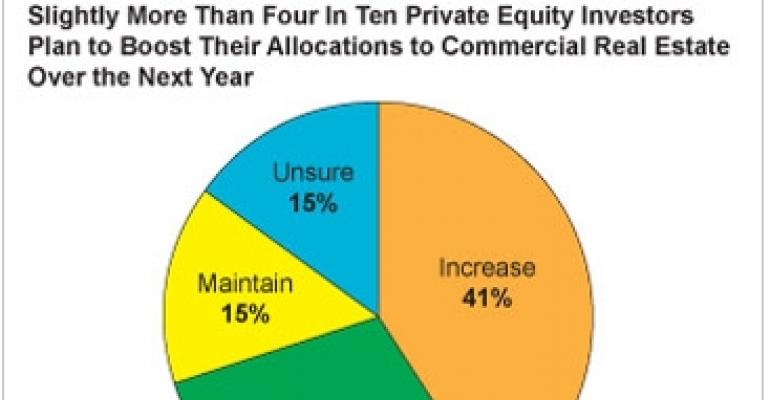What did private equity investors, including huge institutional players such as pension funds, learn most from the recent collapse in commercial real estate values? They want more of the asset class.
A new study of 90 global private equity real estate investors by London-based researcher Preqin confirms that instead of fleeing to the hills, institutional investors intend to commit more capital to private equity real estate funds in 2010 than they did in 2009. And surprisingly, none of the participants in the survey conducted in the fourth quarter of 2009 has abandoned commercial real estate.
In fact, 41% of investors plan to increase their investment in the sector, while 29% expect to invest less than last year. Another 15% say that they will maintain their allocations, and the remaining 15% are unsure as they await the bottom of the market and recalibrate their strategies accordingly.

Overall, the survey results suggest that “confidence is returning and investors are feeling more optimistic about the asset class,” says Forena Akthar, co-author of the Preqin study.
Hesitation lingers
Despite the apparent optimism, investors have not completely thrown caution to the wind when it comes to investing in real estate, whether making direct investments or committing capital to private equity funds. According to the survey, 55% of private equity real estate investors made no new fund commitments in 2009.
That helps explain the huge decline in private equity real estate fundraising activity. According to Preqin, the total capital raised in 2009 equaled just 31% of the levels reached in 2008. In all, 103 funds closed in 2009 with total commitments of $42 billion.
Of those investors who plan to invest in commercial real estate in 2010, only 29% could estimate the number of funds they would invest in, and only 24% had an approximate figure in mind for the amount of capital they would commit.
These figures are much lower than in previous years, when most investors could more clearly predict both the number of funds and the amount of capital they would invest over the next 12 months.
When it comes to the long-term view, however, 75% of investors surveyed remain bullish on the real estate sector. “Despite the gloom, many investors did not lose confidence in the long-term benefits of investing in private equity real estate. They simply were not investing in 2009,” says Akthar, the survey’s co-author.
According to Preqin, returns from private equity real estate funds topped the S&P 500 Index by 35.8% over the past five years.
One long-time institutional advisor, Ted Leary, head of Los Angeles-based Crosswater Realty Advisors, thinks investors will cautiously re-enter the real estate game. He also notes that investors will be in a stronger position to dictate terms, including a reduction in fees, with their fund managers.
“The real estate investment manager community needs to regain the trust of their investor clients,” says Leary. “Some managers will, some managers won’t.”
When and where?
Nearly six in 10 investors (58%) plan to make their real estate investments in the first half of 2010. The remaining 42% are uncertain about when they will make a move in 2010.
And when they do pull the trigger, U.S. investors will likely stick close to home. That means potentially less capital for emerging property markets like China and India.
Not surprisingly, the vast majority of investors (73%) also are shifting their focus to target the two pillars of the commercial real estate industry — debt and distress.
“While investors are still attracted to value-added and opportunistic funds, a growing number of investors are looking to capitalize on opportunities presented by the dislocated real estate market,” says Stuart Taylor, a senior real estate analyst at Preqin.
The largest of these commercial real estate investors — targeting both mortgage notes and properties — include the Abu Dhabi Investment Authority with $62.5 billion in funding. Also in the mix is U.S.-based Allstate Investment Management with $20.7 billion, the California Public Employees’ Retirement System with $13.6 billion and TIAA-CREF with $13 billion.

